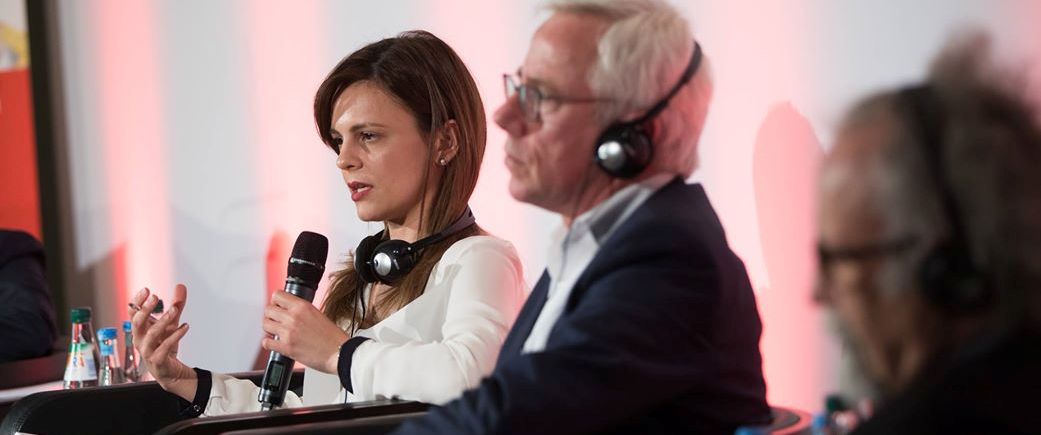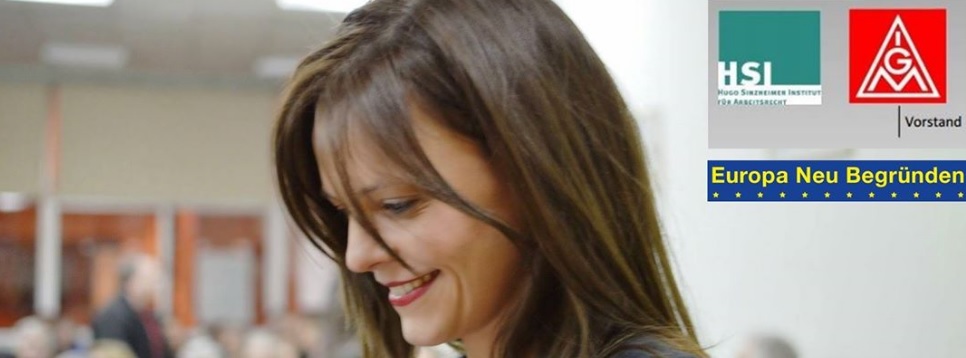Europe’s future is inextricably tied to labour relations, and therefore with the issue of labour relations in Greece. The problem of employment is central today and the answers we give today in Greece will determine all social developments in Europe today. This was the main point of the speech of the Minister of Labour, Effie Achtsioglou, given in the conference “Restoring instead of deregulating labour relations in Greece” (Frankfurt, 16.03). The conference was organized by trade union IG Metall (Industriegewerkschaft Metall), the dominant metalworkers’ union in Germany, making it the country’s largest union as well as Europe’s largest industrial union, and a major trend-setter in national bargaining.
According to Wolfgang Lemb, Managing Director of IG Metall, “the IG Metall message is Collective Labour Agreements for everyone. We need to change neoliberal policies. The restitution of labour law will improve the lives of workers in Greece. The position of the IG Metall is that the German government bears great responsibility for the negative developments in Europe.”
Wolfgang Däubler, professor at the University of Bremen and a member of the Expert Group for the Review of Greek Labour Market Institutions stressed that “there are now voices calling for abolition of labour law […] political pressure should be exerted by German unions to the German government because the attack on labour in Greece is a European development that will hit our own door and we have to put pressure on the German political system.”
 As Minister of Labour Effie Achtsioglou herself emphasized in her speech, “Maybe the title of discussion today has to do with labour relations in Greece, but the real debate goes much deeper than that. In fact, today we are discussing the future of Europe. Turning points in history bring us face to face with crucial questions, the answers to which will determine future social developments. The issue of employment is now a question of such magnitude for Europe today.
As Minister of Labour Effie Achtsioglou herself emphasized in her speech, “Maybe the title of discussion today has to do with labour relations in Greece, but the real debate goes much deeper than that. In fact, today we are discussing the future of Europe. Turning points in history bring us face to face with crucial questions, the answers to which will determine future social developments. The issue of employment is now a question of such magnitude for Europe today.
Today we really need a new political and social plan for Europe. We need a new vision, one that can win the hearts and minds of the working people. Europe needs to show that it cares not just for the few, for profits for free market competition, but that it is big enough to give its people, the social majority, a life with dignity. […]
We do not need a Europe that unpicks the democratic achievements of the people and challenges the European social model. We do not need a Europe run by technocrats without broader social legitimacy. This Europe is a part of the problem; this Europe sustains right-wing rhetoric and nationalist tendencies. The world of work in Europe cannot forget the historical experience of the rise of nationalism and the extreme right. […]
We live in societies that accumulate huge amounts of wealth, while at the same time producing unprecedented inequalities. The explosion of social inequalities during the crisis was not a mistake of the political project of neoliberalism, nor does it constitute collateral damage. Instead, it was and is a very conscious choice. Neoliberalism’s answer to the crisis in Europe was the attack on public services, the restriction of social rights and the devaluation of labour.
For the dominant neoliberal political forces the aim was not just to reduce labor costs. It was to create of a generation of workers who will learn to live with less, not simply lower wages, but with fewer dreams, fewer rights, less dignity.
Experts Report & The importance of sectoral agreements
The memorandum signed by the Greek government and the lenders in the summer of 2015 predicted that in the issues of collective bargaining, collective layoffs and trade union law, Greece must be harmonized with European best practices. In this context, a committee of experts was created, its composition jointly determined by the Greek government and the institutions. This Expert Group published its report ontaining twelve recommendations, some reached unanimously, others with a clear majority.
Specifically on the issue of collective bargaining, the Expert Group unanimously supported the need to restore the extensibility of sectoral agreements, while a majority (6-2) supported the restoration of the principle of favorability. The report outlines a number of other proposals that have to do to restoring minimum wage as object of collective bargaining between social partners, restoring the principle of after-effect etc.

Overall, the Expert Group adopted the position of the Greek government: that the reforms applied during 2010-2014 to the collective bargaining system did not decentralize it -as they were supposed to- but instead led to its complete collapse. So today, for the vast majority of employees, working conditions are specified in individual contracts, while less than 10 sectoral agreements are currently in force in the country. All this in an economy where the vast majority of companies are very small enterprises (with up 10 employees) and the existence of sectoral agreements is particularly crucial for the protection of workers and healthy competition.
Why do some choose to ignore the Expert Group Report?
After the publication of the Expert Group’s Report, which had the official stamp of approval of both the Greek government and the institutions, one would expect that specific recommendations that enjoyed the consensus of the Expert Group would be, if not the final outcome, at least the base of dialogue in our negotiations with the lenders. Instead, the negotiations for the second review met the intransigence of the IMF and the often guilty silence of the European institutions. We knew all along that neoliberalism does not get along with democracy and social and labour rights. Today we are discovering that it does not get along either with proper procedures or with simple arithmetic.
The lack of arguments on the part of institutions is a constant pattern in the negotiations on labour issues. Along with the issue of collective bargaining, the issues of collective layoffs and trade union law are still pending. The IMF stance in all this is highly aggressive towards the working people. They are requesting a duplication of the threshold for massive layoffs, from 5% to 10%, the permission of employers’ lockout and a number of changes that will make it more difficult to strike and reduce the protection of trade union actions […]
The Greek labour market & the future of Europe
Why should a worker in Germany or elsewhere in Europe today be concerned about will happen to collective bargaining and industrial relations in Greece? […] I’ll answer with a vivid example. During the negotiations, when once again, the representatives of the Greek government came back to the findings of the Expert Groups and the text of the Memorandum which refers to the need for Greece to align itself with best practices in Europe, the response from the IMF side was that, for them, the best practices in industrial relations in Europe at the moment are being applied in Greece.
It is obvious that on the issue of labour relations, for the IMF and the European neoliberal forces, Greece is the new paradigm that must be generalized. […] In this sense, ending the deregulation of labour relations and restoring normality in Greece will be a victory for all European workers.
Today, then, we are not just talking about the Greek labour market. Today we are talking about the future of Europe. About if a European country should be an exception to the European social model. We are talking about whether workers have the right to participate in the redistribution of wealth they are producing or, if today’s Europe will continue to be a Europe for the few. If we choose the second way, we have no right to be surprised by the results. We however, are choosing to continue to struggle and believe we have the power to bring the democratic changes needed to build a Europe that can accommodate the dreams and needs of its people.”
Read more: Independent Experts Report supports Greek positions on Labour Relations; Alexis Tsipras on austerity, collective labour agreements and the European social acquis; Collective Labour Agreements: Regaining the lost ground; The government is ‘waging a great struggle to complete the 2nd review,’ Achtsioglou says
Main source [in Greek]: Η μάχη για τα εργασιακά αφορά το μέλλον της Ευρώπης

TAGS: CONFERENCES | CRISIS | GOVERNMENT & POLITICS | LABOUR RELATIONS














